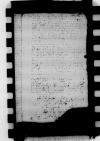List #70
[Ioannes DANTISCUS] do [Maximiliaan van EGMOND-BUREN]Heilsberg (Lidzbark), 1541-01-10
Regest polski:
Dantyszek zapewnia adresata o swojej przyjaźni i sympatii, trwającej niezmiennie pomimo dzielącej ich odległości. Z radością dowiedział się z listu Cornelisa De Scheppera, że cesarz [Karol V] chojnie nagrodził cnoty i zasługi adresata. Gratuluje mu z całego serca uzyskanej godności [gubernatora Fryzji]. Podkreśla swoją zażyłość z adresatem i czeka na wieści od niego.
Rękopiśmienne podstawy źródłowe:
| ||||
Tekst + aparat krytyczny + komentarz Zwykły tekst Tekst + komentarz Tekst + aparat krytyczny
Spectabilis Domine, amice carissime.
Salutem et felicitatem superinscribed⌈temtem superinscribed⌉.
Sunt written over tem⌈tem Sunt Sunt written over tem⌉, qui putant, inter quos
Fuitque mihi gratissimum ex cf.
Non potui itaque paper damaged⌈[potui itaque]potui itaque paper damaged⌉ committere, quin tibi, veteri amico meo et paper damaged⌈[meo et]meo et paper damaged⌉ [...] paper damaged⌈[...][...] paper damaged⌉ con paper damaged⌈[con]con paper damaged⌉tubernali iis(?) ex animo congratularem paper damaged⌈[arem]arem paper damaged⌉ [...] paper damaged⌈[...][...] paper damaged⌉ prout paper damaged⌈[prout]prout paper damaged⌉ eis, quibus bene volo, accedit, [...] paper damaged⌈[...][...] paper damaged⌉ has igitur or equidem⌈igiturigitur or equidem⌉ itaque ad te dedi [...] paper damaged⌈[...][...] paper damaged⌉ iucun paper damaged⌈[iucun]iucun paper damaged⌉dam coniunctionem et dulcissimam consuetudinem nostram paper damaged⌈[issimam consuetudinem nostram]issimam consuetudinem nostram paper damaged⌉ [...] paper damaged⌈[...][...] paper damaged⌉  BCz, 245, p. 238 refricarem meique in te animi facerem significationem non eo, ut superinscribed in place of crossed-out quo⌈quo eo, ut eo, ut superinscribed in place of crossed-out quo⌉ tibi ad tuae felicitatis cu adscribed in place of crossed-out [...]⌈[...] hidden by binding⌈[...][...] hidden by binding⌉cucu adscribed in place of crossed-out [...]⌉mulum usui esse possim, quod tamen velim maxi adscribed in place of crossed-out m[...]⌈m[...] hidden by binding⌈[...][...] hidden by binding⌉maximaxi adscribed in place of crossed-out m[...]⌉me, sed quo te hic etiam per tot locorum inter hidden by binding⌈[r]r hidden by binding⌉valla amicum adhuc, eumque sincerum, habere agnoscas, utque vel hoc modo vel unas a te extorqueam, quibus(?) superinscribed⌈quibus(?)quibus(?) superinscribed⌉ de iis tuo statu imprimis, vti(?) commune tecu<m> mihi sit gaudium, et quae apud vos geruntur, fierem certior. Qua in re mihi Tua Dominatio gratificabitur plurimum.
BCz, 245, p. 238 refricarem meique in te animi facerem significationem non eo, ut superinscribed in place of crossed-out quo⌈quo eo, ut eo, ut superinscribed in place of crossed-out quo⌉ tibi ad tuae felicitatis cu adscribed in place of crossed-out [...]⌈[...] hidden by binding⌈[...][...] hidden by binding⌉cucu adscribed in place of crossed-out [...]⌉mulum usui esse possim, quod tamen velim maxi adscribed in place of crossed-out m[...]⌈m[...] hidden by binding⌈[...][...] hidden by binding⌉maximaxi adscribed in place of crossed-out m[...]⌉me, sed quo te hic etiam per tot locorum inter hidden by binding⌈[r]r hidden by binding⌉valla amicum adhuc, eumque sincerum, habere agnoscas, utque vel hoc modo vel unas a te extorqueam, quibus(?) superinscribed⌈quibus(?)quibus(?) superinscribed⌉ de iis tuo statu imprimis, vti(?) commune tecu<m> mihi sit gaudium, et quae apud vos geruntur, fierem certior. Qua in re mihi Tua Dominatio gratificabitur plurimum.
Quam faustissime hidden by binding⌈[ime]ime hidden by binding⌉ valere opto.
Ex castro meo

